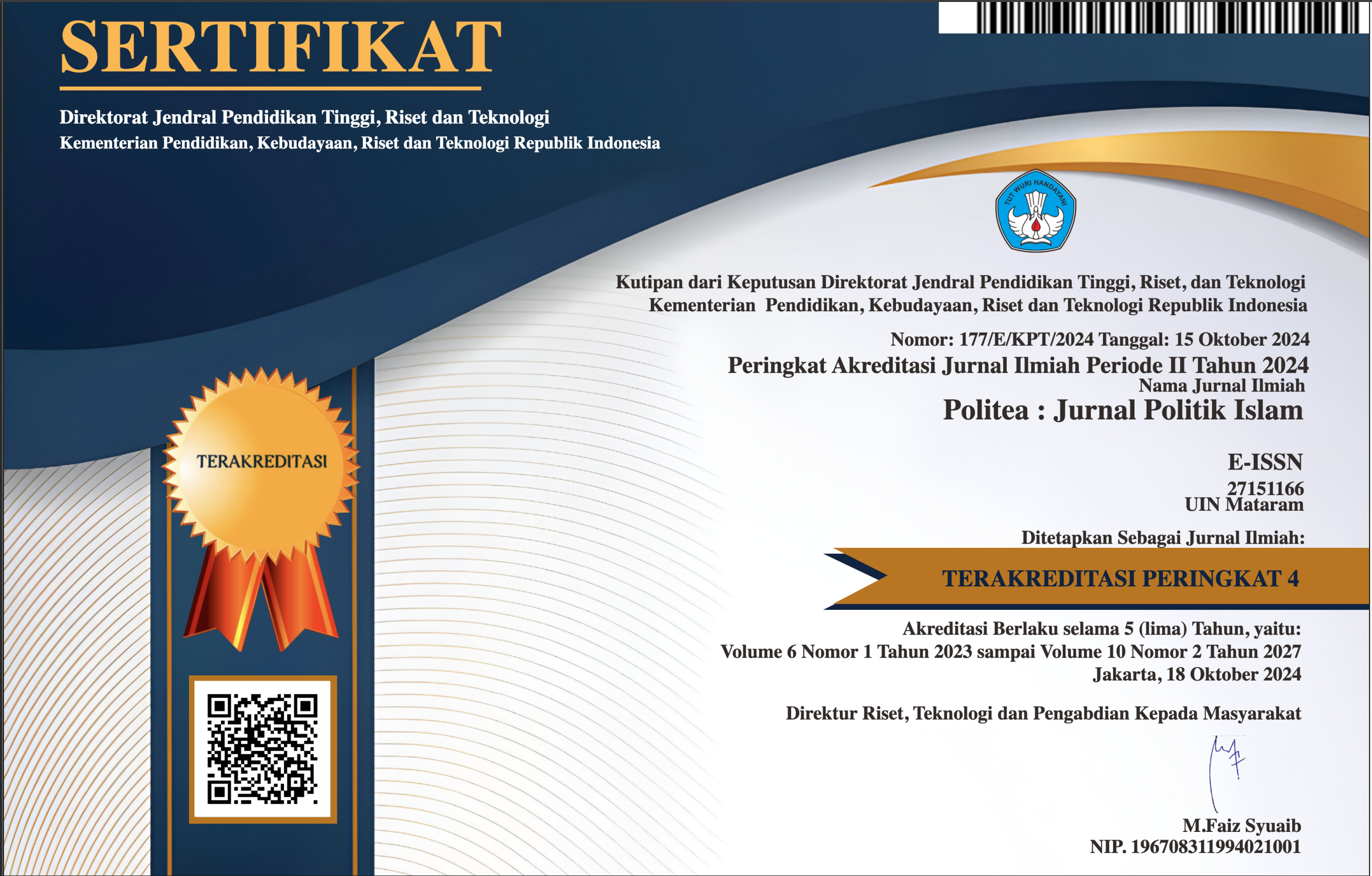WOMEN AS A STRATEGIC GROUP: WOMEN'S STRATEGY IN POLITICAL NETWORKS THROUGH THE ECONOMIC AREA
(IWAPI NTB CASE STUDY)
DOI:
https://doi.org/10.20414/politea.v7i1.10160Keywords:
Women, strategic groups, agency, appropriation of interestsAbstract
Abstract
Women’s participation in economic field and politic is often viewed in a dichotomous manner, where the economy is referred as "low politics." Women’s participation in economic organization is also seen as non-strategiv activism, which interpreted as activities that are distant or excluded from electoral politics and has less influence on the decision-making process. This research aims to challenge the argument and suggests that women's roles in the economy are indeed interconnected with the political sector. The study argues that women use their institutional capital as members of IWAPI to build relationships and political networks, where the appropriation of interests which means securing access to specific resources is the main goal. This research utilizes the Strategic Group theory from Evans Dieter-Evers and finds that women affiliated with IWAPI adopt personal and corporate appropriation modes in pursuing their interests. Personal appropriation is closely related to strengthening political networks through political parties to drive institutional change, while corporate appropriation is carried out by IWAPI members through expanding business networks and forming resource alliances. Furthermore, women can be categorized as a strategic group with business types and often employ cooperative strategies with other strategic groups. IWAPI is ultimately referred to as an organization formed by strategic groups of women for the appropriation of specific interests.
Keywords: Women, strategic groups, agency, appropriation of interests
Downloads
References
Babbie, Earl. 1980. The Practice of Social Research. California: Belfast.
Birch, A.H. 1971. Key Concept in Political Science: Representation. London: Pall
Mall Press Ltd.
Bryson, Valerie. 2003. Feminist Political Theory: an Introduction (2nd edition).
New York: Palgrave Macmillan
Evers, Hans-Dieter & Tilman Schiel. 1990. Kelompok-kelompok Strategis: Studi
Pembangunan tentang Negara, Birokrasi,dan Pembentukan Kelas di Dunia Ketiga.
Jakarta: Yayasan Obor Indonesia.
Evers, Hans-Dieter & Simon Benedikter. 2009. Strategic Groups Formation in the
Mekong Delta. Working Paper, Center for Development Research, University of Bonn.
Eisenstein, Zillah R. (ed). 1979. Capitalist Patriarchy and The Case for Socialist
Feminism. New York: Monthly Review Press
Evans, Mary, et.al. 2014. The Sage Handbook of Feminist Theory. London: Sage
Publication, Ltd.
Fakih, Mansour. 2001. Sesat Pikir Teori Pembangunan dan Globalisasi.
Yogyakarta: Insist Press
Fakih, Mansour. 2010. Analisis Gender dan Transformasi Sosial. Yogyakarta:
Pustaka Pelajar
Fashri, Fauzi. 2014. Pierre Bourdieu: Menyingkap Kuasa Simbol. Yogyakarta:
Jalasutra
Goerzt, Gary & Amy G. Mazur. 2008. Politics, Gender and Concepts:Theory and
Methodology. Cambridge: Cambridge University Press
Heywood, Andrew. 2013. Politik (terj). Yogyakarta: Pustaka Pelajar
Haryatmoko. 2016. Membongkar Rezim Kepastian: Pemikiran Kritis PostStrukturalis. Yogyakarta: Kanisius Press
Hastuti, Kurniawati. (Ed). 2022. Gender and Politics in Post-Reformasi Indonesia:
Women Leaders within Local Oligarchy Networks. Singapore: Springer.
Krippendorff, Klaus. 1991. Analisis Isi Teori dan Metodologi. Jakarta: Rajawali
Pers.
Krook, Mona Lena & Fiona Mackay. 2011. Gender, Politics and Institution:
towards a feminist institutionalism. New York: Palgrave Macmillan
Lovenduski, Joni. 2005. State Feminism and Political Representation. Cambridge:
Cambridge University Press.
Menkhoff, Thomas, Hans-Dieter Evers & Yue Wah Chay. (Eds). 2005. Governing
and Managing Knowledge in Asia. Singapore: World Scientific Publishing.
Moeleong, Lexy. 1995. Penelitian Kualitatif, Fenomena Sosial dalam Kehidupan
Masyarakat. Bandung: Rosdakarya.
Nazir, Moh. 1981. Metode penelitian. Jakarta: Ghalia Indonesia.
Parpart, Jane L, et.al. 2000. Theoretical Perspective on Gender and
Development. Canada: International Development Research Centre.
Pendit, Putu laxman (ed.). 2009. Merajut Makna: Penelitian Kualitatif Bidang
Perpustakaan dan Informasi. Jakarta: Penerbit Cita Karya Karsa Mandiri.
Rodiyah, Isnaini. “Keterwakilan Perempuan dalam Dewan Perwakilan Rakyat
Daerah.” Jurnal Kebijakan dan Manajemen Publik. Vol. 1 No. 1 Tahun 2013
Ruwaida, Ida . " Pemberdayaan dan Aksi Kolektif Perempuan: Sebuah Refleksi
Sosiologis. Jurnal Masyarakat dan Budaya. Vol. 18 No. 2 Tahun 2016.
Windyastuti, Dwi & Budi Hendrarti. “Politik Representasi Perempuan: Advokasi
Kebijakan Perlindungan Perempuan.” Jurnal Masyarakat, Kebudayaan dan Politik Vol. 26
No. 2 Tahun 2013.

Downloads
Published
Issue
Section
License
Copyright (c) 2024 Guruh Sugiharto

This work is licensed under a Creative Commons Attribution-ShareAlike 4.0 International License.






